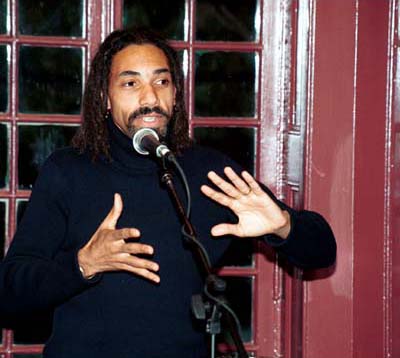Rewriting history with a new textbook
Robin Kelley offers an alternative to the the traditional textbook -- one that makes an argument and admits to it.
The Daily Pennsylvanian
November 29, 2000

-
Robin Kelley speaks at Kelly Writers House last night about his new textbook. Kelley broke from the traditional way of writing history textbooks by including only events that included African Americans.
Robin Kelley offers an alternative to the the traditional textbook -- one that makes an argument and admits to it.
Kelley co-edited a textbook that traces American history from an African-American perspective by placing blacks at the center, and excluding events and traditions in which African Americans were not involved.
And last night, as part of a lecture and book signing co-sponsored by the Afro-American Studies Program and the Kelly Writers House, he discussed the goals for his recently released book, To Make Our World Anew: A History of African Americans.
"The book revamps the way we think about American history through the eyes of black people," said Kelley, a New York University professor of History and African Studies.
The book's target audience is high-school-aged readers, as the professor hopes that it will be incorporated into secondary school curricula.
Kelley attempted to incorporate both social and political history into his narrative. He said the book incorporates different perspectives -- indeed, it focuses more on the underprivileged than the privileged -- because "young readers need to understand the idea of difference in terms of power relations, instead of just difference for difference sake."
In response to an audience member's question about the influence that such a book might have on legislators, Kelley said the book is not a direct political challenge, though parts of it might be perceived as such.
"We write for an audience that begins in a place of enormous sophistication, as well as one that starts on ground zero and is looking for heroes," Kelley said.
"We can't not have heroes," he continued. Kelley wanted to portray black people that have succeeded within the capitalist framework, and not always through the exploitation of others.
"The people who need to read this book are not just black people, especially white people, especially," he emphasized.
Kelley went on to say that injustice needs to be corrected through legislation, and not literature. He admitted that he has yet to figure out how to impact decision making, but is nonetheless happy to do his part by writing.
Most of the audience members had not read Kelley's book, and so his talk focused more on his general ideology than on the book's specifics.
Toward the end of the talk, when asked his opinion on some students' lack of education about minorities, Kelley said the entire framework of secondary education needs to be reformed.
"In the end, students need to be tested on American history. And how can this happen if the whole of history itself is contested?" Kelley asked.
Fourth year History graduate student Paulina Alberto stated, "[The book] takes a stance and later we can discuss whether we agree. It refutes current textbooks that pretend to be objective." Alberto has not read the book, but said she is planning to do so and would also like to work as a teacher in the future.
But Gilbert White, a graduate student at Temple University who has read the book, had a drastically less positive take.
"It offered no solution. A book with a solution is what black readers are actually looking for, so we can start another revolution," White said.
